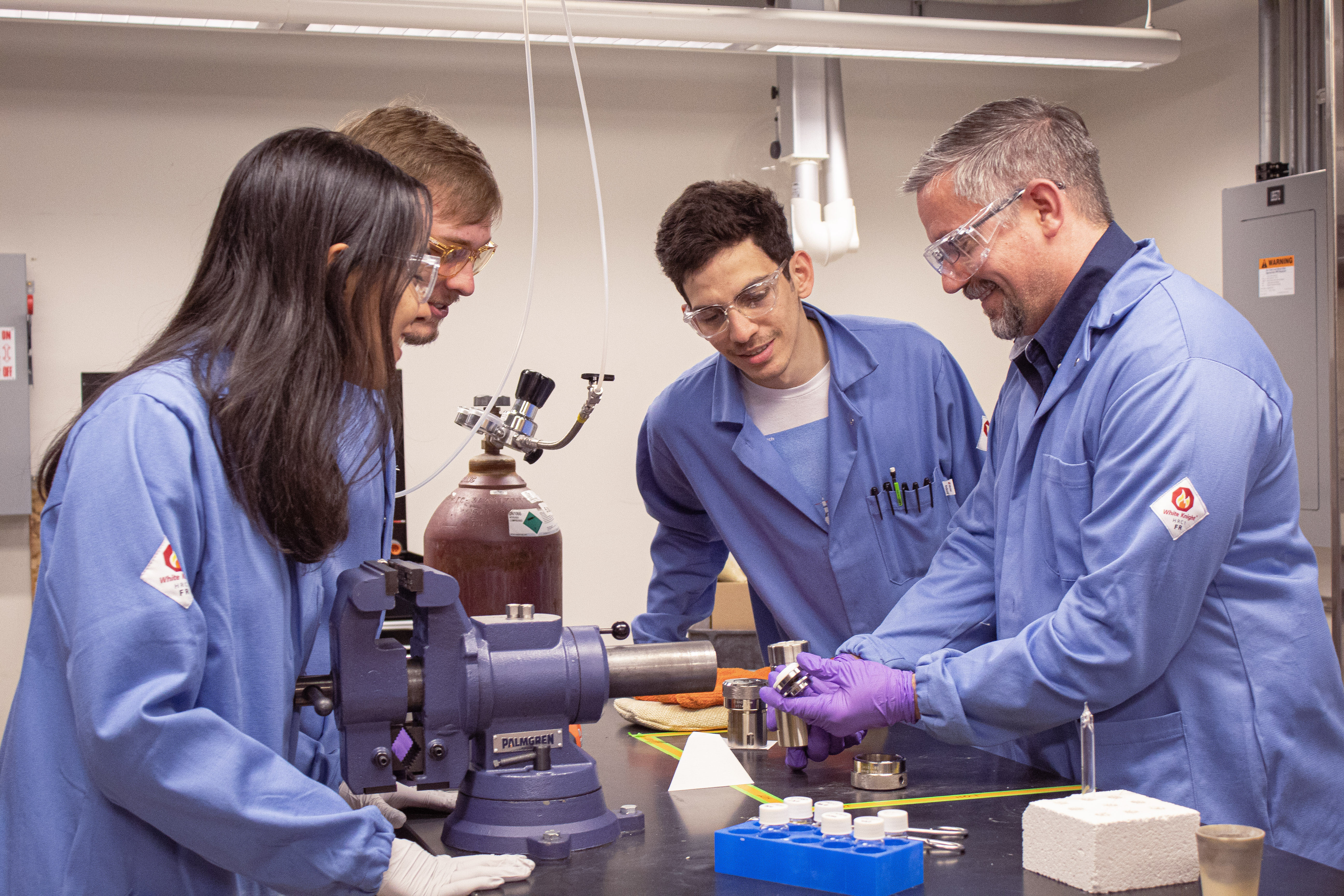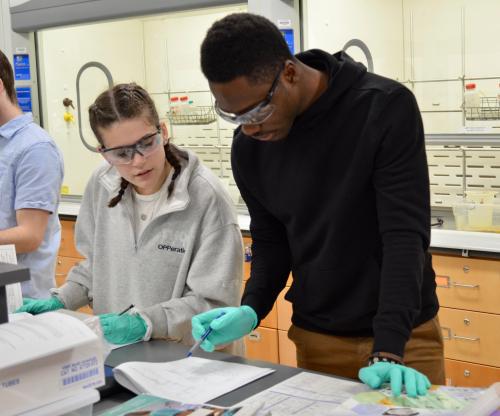Submitted by tab18
on
Chemistry Grad Program
Prospective Ph.D. Students
Prospective Ph.D. Students
The Department of Chemistry's graduate program boasts a unique educational opportunity.
Our program allows students substantial flexibility in developing a Ph.D. experience uniquely suited to their personal interests and goals. We offer a doctoral degree program in which all barriers between the various areas of chemistry research (analytical, biological, environmental, inorganic, materials, organic, physical, and theoretical) have been removed; this fosters an environment rich with collaborative opportunities. Our graduate students excel in their thesis research, develop their scientific passion and expertise, and contribute to the broader scientific community.
Learn More About the Program Below:
During the first semester at Penn State, Chemistry graduate students “rotate” through three research labs, spending about a month in each lab. The advisor selection process then begins in December.
Within the first 12 to 18 months, students complete five graduate level courses. Students are not required to follow a pre-set curriculum, but rather have freedom to follow their individual interests through personalized program plans.
Image

Students are encouraged to choose from a variety of intermediate and advanced courses in Chemistry, including courses on special topics taught by faculty members actively engaging in research in those areas. Courses in related fields such as physics, mathematics, biochemistry, biophysics, polymer science, material science, and computer science may also be taken.
Once coursework is completed, students are required to successfully complete their Qualify Exam, taken after one year, and the Oral Comprehensive Exam, taken by the end of the fifth semester. This comprehensive exam consists of a description of a student’s research progress and the defense of a brief original research proposal.
For further information on degree requirements and graduate level courses being offered, please visit the bulletin.
Please visit the How to Apply page for more details and deadlines. The GRE is no longer required. If the application fee imposes a financial burden, limited fee waivers are available. Please email chemgrad@psu.edu to inquire.
The most recent study by the National Research Council (NRC) placed Penn State as the 12th ranked graduate school in the US.
Penn State ranks 22nd in the country in total research expenditures according to the NSF. In addition, the University ranks fourth nationally in the breadth and depth of its research enterprise, as measured by the number of top-10 rankings in key fields and subfields of science and engineering. The Department of Chemistry is world-renowned for its cutting edge and highly interdisciplinary research.
Image

Image

Penn State Chemistry maintains state-of-the-art facilities, providing students with access to the modern instrumentation needed to carry out their research projects. Chemistry graduate students have unrestricted access to shared facilities throughout the College and University, which provides broad opportunities for collaboration across multiple disciplines.
More information and links to shared facilities are available here.
Individual faculty also have specialized instruments and facilities within their research labs; please browse the faculty webpages for discipline-specific facilities.
Penn State Chemistry offers an exciting, supportive environment to pursue graduate research with world-class faculty and state-of-the-art research facilities. Our graduate doctoral program provides research opportunities across all the major chemical disciplines:
Analytical, Biological, Inorganic, Materials, Organic, Physical, Theoretical
Our faculty are leading cutting-edge research groups tackling some of the most important and challenging scientific questions in their fields. In addition, faculty members in the Department of Chemistry actively participate in several interdisciplinary institutes and centers at Penn State, including the Huck Institutes of the Life Sciences, Materials Research Institute, Institute for Computational and Data Sciences, and Institutes for Energy and the Environment. These collaborations strengthen the research program at Penn State and provide additional training opportunities for graduate students.

Click here for a list of faculty that are accepting graduate students.
Please visit the Graduate Teaching Assignment page for more details.
Image

The Department of Chemistry strives to create a welcoming and inclusive environment for everyone. Our goal is to create a climate where everyone can be their authentic self because we believe every member of our community is important. We seek to create a community that encompasses all forms of diversity of dimensions and intersections, including race, ethnicity and nationality, age, gender and gender identity, sexuality, class and religion. We believe that every student, faculty, and staff in our community is important and we aim to increase access and broaden opportunities for diverse and underrepresented groups within our department. Visit our Climate and Diversity page for more information.
We have a highly active Graduate Student Association (GSA) that will be one of your first points of contact when you start at Penn State. The GSA is a voice for the graduate student body and helps to build community within the department. The GSA helps to plan the graduate program orientation, pairs up incoming students with mentors, organizes social events like hikes and coffee hours, facilitates networking and career development, and runs volunteer outreach activities. We also have graduate student advocates that help individual graduate students work through any issues that may arise. This includes helping graduate students approach the Graduate Program Coordinator as needed, and serving as a liaison between graduate students, the Graduate Student Association, the Graduate Program Chair, and the Associate Head for Climate and Diversity.
We also know that diversity and inclusion drive innovation, so we aim to create a supportive research community that fosters creativity and collaboration across disciplines throughout the graduate program. There are no boundaries between the traditional divisions of chemistry in our department; all students follow the same graduate program and requirements no matter if you are studying organic chemistry, physical chemistry, or biochemistry. If you’re not sure what you want to study yet, no problem! We have a lab rotation program at the start of your first year that will help you find your passion and where you belong. So, if you decide to embark on a chemistry Ph.D. at Penn State, know that there is a community of faculty, staff, and students here to support you on your journey, wherever that may lead. We hope that you will decide to join us!
Image

A Ph.D. in Chemistry at Penn State is fully supported by teaching and research funds – you will not have to pay to pursue your graduate education. All Chemistry graduate student assistantships include a stipend, health care benefits (medical, dental, and vision), and full tuition support throughout their Ph.D. studies and research. These benefits are extended to all domestic and international graduate students.
We also offer incoming students additional funds for their first year to assist with moving and other expenses. The stipend for the full academic year of 2025/2026 is $34,919. Estimated living expenses (rent, utilities, food, transportation, etc.) is $23,300.
There are two types of assistantships:
-
Teaching Assistantships – Most graduate students in Chemistry will serve as TA’s for their first 2 semesters. We take care to ensure that TA appointments require no more than 20 hours per week (laboratory or recitation instruction, preparation, grading, etc.). Many students in their first semester are given an assignment to teach 10 hours of general chemistry lecture (CHEM 110) per week and 10 hours of general chemistry lab (CHEM 111). Depending on the needs of the department, interested students may fulfill their teaching requirement by teaching organic chemistry lab (CHEM 203/213) or physical chemistry lab (CHEM 457). All new teaching assistants receive training specific to the course, as well as in pedagogy more broadly, before their assignments begin. Teaching provides graduate students with many professional development opportunities that are applicable in academic, industry, and other career paths, including practice in public speaking, communication, and interpersonal skills.
-
Research Assistantships – After the spring semester of their first year, graduate students are typically supported by research assistantships.
All students are eligible for annual awards to fund travel to conferences to present their work, as well as to reward exceptional teaching, scholarship, and service to department community.
Incoming students may be offered additional fellowships through one of the following programs:
-
University Graduate Fellowships support recruitment of the very highest caliber prospective students to Penn State’s research doctorate (Ph.D.) programs.
-
The Dean’s Distinguished Graduate Scholarship supports recruitment of the very highest caliber prospective students who will contribute to the diversity in graduate education at the institution.
-
The Science Achievement Graduate Scholarships support recruitment of the very highest caliber prospective students who also have a demonstrated interest in the advancement of women in the sciences.
-
Bunton-Waller Assistantships support recruitment of the very highest caliber prospective students who will enhance diversity on our campus.
The University also offers several sessions each year to assist students preparing to apply for national fellowships including the NSF Graduate Research Fellowship and the National Defense Science and Engineering Graduate Fellowship.
The Career Network and Recruitment Fair is an on-site recruiting opportunity that occurs early in the fall semester. For more than 40 years, it has brought industry representatives and recruiters to the Department of Chemistry in order to meet students and faculty. This two-day event enables recruiters to meet and interview our graduate students as well as discuss science and possible collaborations with our faculty.
Image

Visit our Frequently Asked Questions page for students and postdocs or go to the Career Network and Recruitment Fair homepage.
Image

State College is located at the geographic center of Pennsylvania, situated within the ridge-and-valley province of the Appalachian Mountains. Frequently listed as one of the most affordable and safest college towns in the country, “Happy Valley,” as it is often referred to, is within driving distance of several major metropolitan areas including New York City, Washington DC, Philadelphia, Pittsburgh, Baltimore, and Cleveland.
State College is exceptionally bicycle-friendly. With hundreds of miles of trails (paved, gravel, and rugged) in and around town, it is easy to get to and from campus safely by bike, get out into the woods, or anything in between. The area also offers several state and local parks with an array of year-round outdoor activities including hiking, camping, biking, as well as skiing and snowboarding.
University Park Airport (SCE) is a 10 minute drive from campus and has nonstop flights to hubs in Chicago, Detroit, Newark, and Philadelphia. There is an Amtrak station in Lewiston, roughly 30 miles from State College, with rapid access to Philadelphia and other east coast cities.
To learn more about the Department of Chemistry graduate program, please visit our FAQ page.
The Penn State Department of Chemistry has given me the invaluable experience of teaching hands-on chemistry classes at the undergraduate level, researching exciting and innovative topics in some of the world's best chemistry laboratories, and learning from leaders in the field of chemistry in small classroom settings. I know that I will walk away from this close-knit, supportive, and collaborative department with the tools I need for a successful career in academia."



